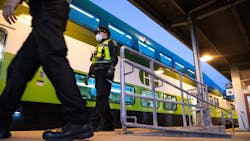Metrolinx commits to the Ontario anti-human trafficking strategy
Metrolinx is offering new training to help employees disrupt human trafficking on its networks and asks everyone to learn the signs to mark National Human Trafficking Awareness Day on Feb. 22
Metrolinx notes organized criminal networks and individuals can operate throughout the country and in Ontario. Traffickers prey on traditionally marginalized communities, including Indigenous women and people who identify as LGBTQ+ to coerce them into forced labor and sexual exploitation. Young women and girls are particularly at risk, though it is a crime that also affects boys and men.
As a hidden crime, most cases of human trafficking go undocumented, but Metrolinx notes studies show that traffickers use public transit as part of their operations. To help disrupt traffickers’ use of the networks, Metrolinx is supporting Ontario’s anti-human trafficking strategy. The transit agency is raising awareness and focusing on early intervention; knowing one interaction with a revenue protection officer, special constable or an informed rider can change someone’s life.
That’s why when a Metrolinx revenue protection officer recently met a young woman exhibiting some common red flags associated with human trafficking, he took action. He noticed she was travelling alone on a train with no fare payment, and with no money or identification. She told him she was travelling to Niagara Falls to meet a man she met on the internet but had no plans once she arrived there. Concerned for her safety, the revenue protection officer encouraged her to pause her trip. He helped the woman get off the train and took her to meet a Metrolinx special constable. The special constable helped the young woman contact her mother and arranged for a taxi to bring her to a safe location.
Knowing the warning signs of human trafficking is one of the best ways to combat it. So, as a part of its prevention strategy, Metrolinx is rolling out human trafficking awareness training for all employees. Knowing how to spot the common warning signs can help identify when a vulnerable person might need help.
Metrolinx says it will continue to look for new ways to disrupt human traffickers across the transit network. The transit agency will also find new solutions to help survivors who use GO or UP services to escape human trafficking.
To mark National Day of Human Trafficking Awareness Day, Metrolinx is asking everyone to take the time to learn the signs of human trafficking.
If there is an immediate danger or if you suspect someone is being trafficked, call 911 or your local police. If you or someone you know needs support or you want to report a potential case, call the National Human Trafficking Hotline at 1 (888) 373-7888. The Canadian human trafficking hotline is 1-833-900-1010.

